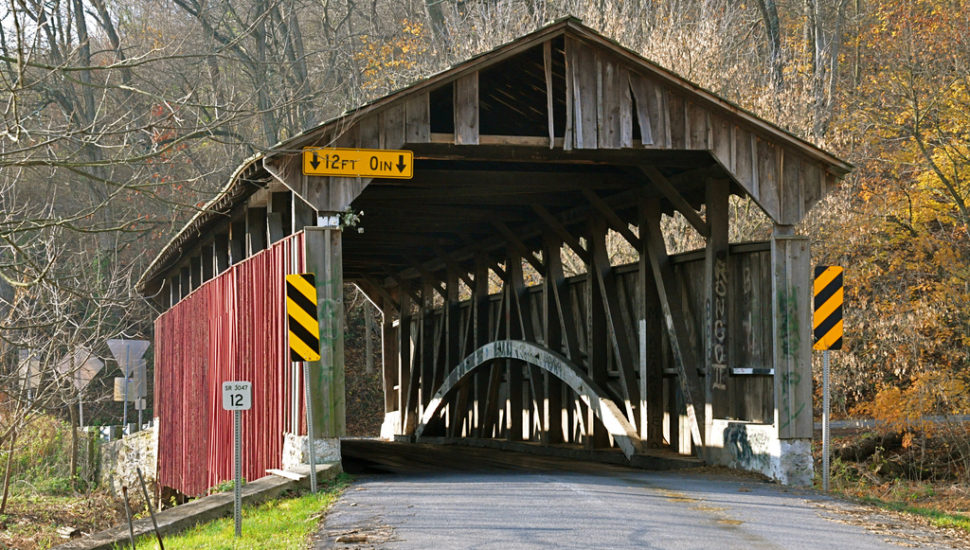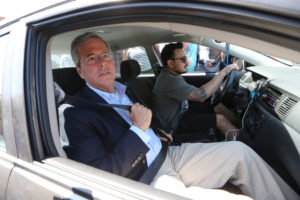Covered Bridge: Is Silicon Valley Creating a Better World?

Of all things, Uber is turning out it be a major policy issue in the run-up to the 2016 presidential election. Candidates are being asked to weigh in on the fairness of the taxi service’s contractor model, whereby instead of employing cab drivers, Uber contracts with them– insulating Uber from the legal responsibilities of employer-employee relationships. Things like health care coverage for full-time employees, a right to remuneration for expenses, etc are typically not granted to contractors.
It’s an especially difficult policy balance for a democratic candidate like Hillary Clinton. The democratic frontrunner is seen favorably by Wall Street, Silicon Valley’s greatest cheerleader, and she will have to balance their interests with a policy message that appeals to unions, for whom Uber’s model is a prime evil.

To make things more complicated, it’s also unclear as to whether Uber has a legal obligation to treat their drivers as employees, despite contracts. According to Entreprenuer.com, last month a “California Labor Commissioner’s Office ruling that a San Francisco-based driver for the ride-hailing service should be classified as an employee, not a contract worker, made waves in Silicon Valley and beyond.”
That legal battle is likely to play out over many years, but it won’t solve what some see as a moral issue. Does a company that values itself at $50 billion have an ethical obligation to provide benefits to their full-time employees? Given that the 2016 election will center on income inequality it’s a question that isn’t likely to go away anytime soon.

But it brings up another, more difficult question: are Bay-area tech companies creating the world we actually want to live and work in?
The New York Times put forward a similar question in their ‘Room For Debate’ series:
“Silicon Valley has “a greater capacity to change the world than the kings and presidents of even a hundred years ago,” one wealthy Facebook beneficiary supposedly told a tech conference last year. Many tech luminaries think they are ”doing God’s work.” But are the innovations coming out of the Bay area really creating a new and better world, or just making lots of money for a few people?”
Responding to that question, Susie Cagle writes that “for all its supposed disruption, the tech industry has not challenged much about the concentrations of power and wealth in the global economy,” and continues:
“For example, we now have the tools and ability to disrupt the taxi industry by allowing collectives of drivers to reach customers directly — but instead, we have Lyft and Uber, multibillion dollar companies that neither offer benefits to their drivers, nor truly give them the opportunity to run their own independent businesses.”
Taking a less cynical view, Madelyne Xiao, writes that yes, most Silicon Valley companies are no different from any other businesses insofar as they are designed to make money. However, for Xiao, that doesn’t mean we can’t also embrace and advance technology as a life-improving industry, writing:
“Sure, not all effects of technology are positive — some social-impact goals on mission statements are dubious, to say the least, and the lack of diversity undercuts the industry — but technology’s capacity for positive change is undeniable. The building of life-changing inventions — like 3-D printed prosthetic limbs — show that the industry has the potential to continue to grow in beneficial ways, and we’d like to see this potential come to fruition.”
Here’s hoping. The idea that company’s must play a role in society beyond generating income and returning value to shareholders is a new, and good development in the history of business. However, Silicon Valley, like our presidential candidates, should expect to be held accountable to the breadth of their own rhetoric.
Connect With Your Community
Subscribe to stay informed!
"*" indicates required fields

































![95000-1023_ACJ_BannerAd[1]](https://vista.today/wp-content/uploads/2023/03/95000-1023_ACJ_BannerAd1.jpg)

















